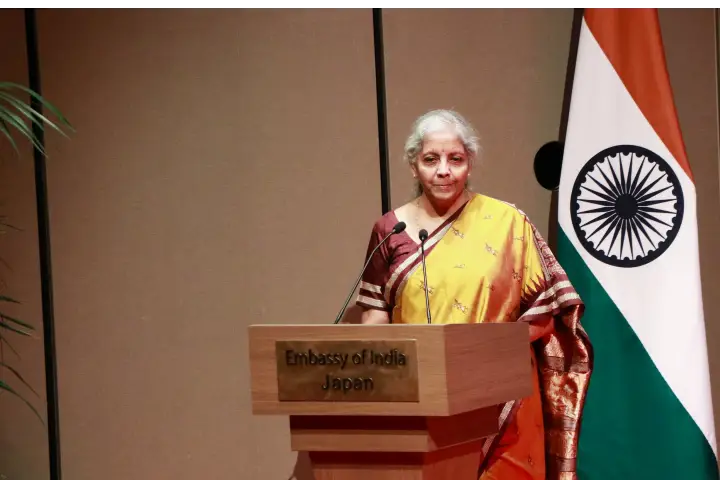

Finance Minister Nirmala Sitharaman (Image courtesy: Finance Ministry)
Finance Minister Nirmala Sitharaman’s Japan visit has acquired relevance because of the underlying economic diplomacy amid Japanese companies looking to expand investments and diversify their existing businesses in India. Japan, which has already committed to invest $42 billion in India in the next five years, is now interested in new sectors of growth which include e-commerce, healthcare, agro-tech, retail– other than automobiles or electronics. Though Sitharaman was in Japan to attend a G7 meeting, the Finance Minister has tried to use this opportunity to highlight the changing economic and business contours in India.
India is an invitee to G 7 Finance Ministers and Central Bank Governors meeting. Incidentally while India has acquired the one year presidency of the G20 nations, Japan is chairing the G7.
“This will be important as Japanese companies are keen to invest more in India but we need to market ourselves even better to ensure that we do not lose out to other nations,” a researcher engaged with an industry body said. Several countries including Vietnam are coming up as credible investment options. Japan is already Vietnam’s third-largest investor after Singapore and South Korea.
Interestingly however, India remains the top investment destination for Japanese companies. A study by Japan External Trade Organisation (JETRO) revealed that more than 72 per cent of the Japanese companies are keen to expand their operations in India. For China, the number is small at only 33.4 per cent.
According to a report released in November 2021– undertaken by Nasscom in partnership with the Nomura Research Institute, Japanese investment in India has grown four times since 2016 creating 102,000 jobs.
Despite her busy schedule, Sitharaman also interacted with investors and business leaders on the theme of “Rising Investment Opportunities: Destination India”, organised jointly by the Japan Chamber of Commerce & Industry (JCCI) and the Indian Embassy.
The focus now is to draw more small and medium enterprises from Japan into India.
“Japanese companies are very positive about India’s economy,” Takashi Suzuki, Chief Director General (South Asia), JETRO told India Narrative. “Until now, Japanese companies have had a very good experience in India. Our companies are making profits. If you see Uniqlo, it has already turned profitable within three years of entering the Indian market,” he said, adding that there are several issues including as well which need to be resolved.
“While Aatmanirbhar Bharat is a very good policy, at times in certain cases, India’s trade policy tends to be protectionist. So if imports of certain items which also include raw materials and several food items are restricted, it poses a big challenge for the smaller companies,” Suzuki said.
In March, Japanese Prime Minister Fumio Kishida visited India—the second visit in a year.
Last year, Prime Minister Narendra Modi during his visit to Tokyo invited Japanese businesses to invest in India as well. The high profile back-to-back visits will further boost bilateral engagements including economic cooperation of both countries.
Meanwhile, as India aims to be the global manufacturing hub, New Delhi must readjust its policy decisions in a timely manner to boost investments, especially in the changing world order. Or else it could well be a missed opportunity for India.
Also read: Govt inks pact with Japan to develop 4 stations as smart hubs on Mumbai-Ahmedabad rail route
Israel Defence Forces Spokesperson Brigadier General Effie Defrin on Thursday said that Iran has expressed…
India's Hindustan Aeronautics Limited (HAL) and French engine manufacturer, Safran Aircraft Engines, signed an agreement…
India has emerged as a country with the third-largest growth in power generation capacity globally…
Prime Minister Narendra Modi hailed Indian chess grandmaster Divya Deshmukh for defeating world number one…
The family of detained Baloch leader Mahrang Baloch has accused prison authorities at Quetta's Hudda…
The QS World University 2026 Rankings bring great news for our education sector, as the…